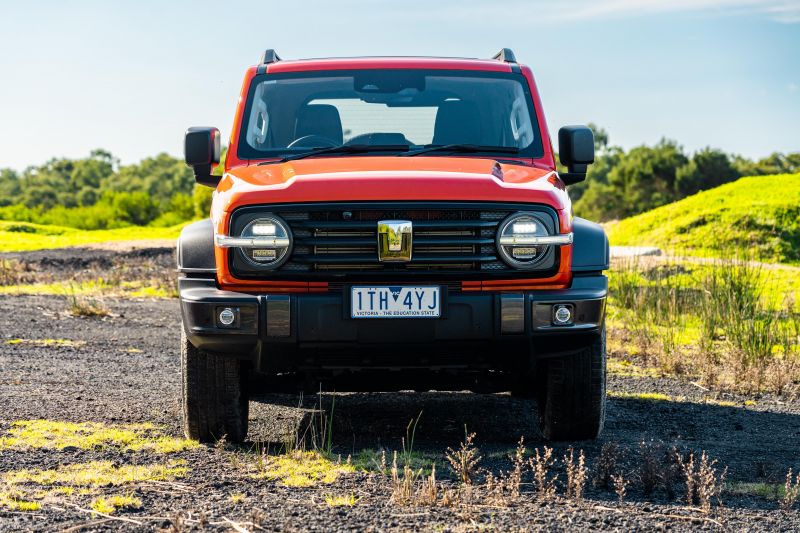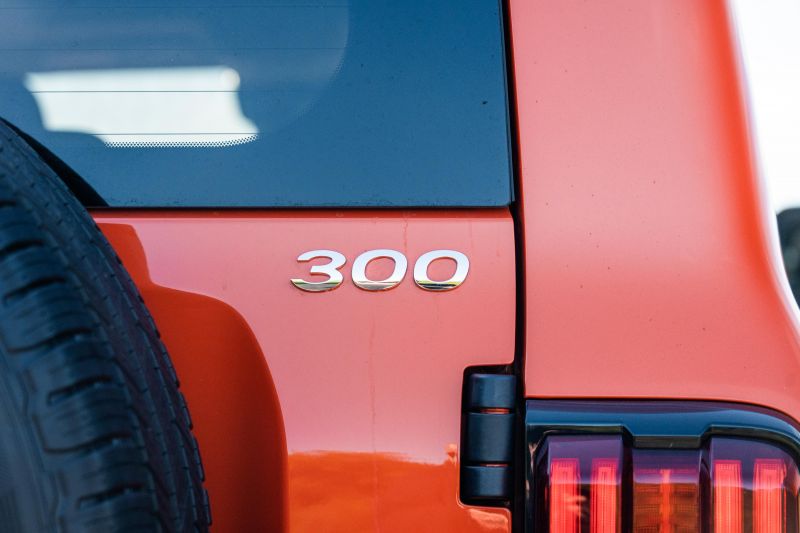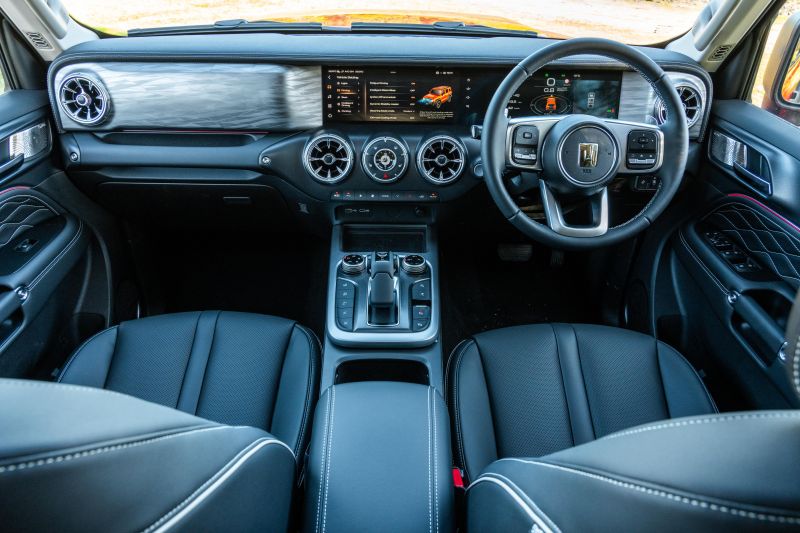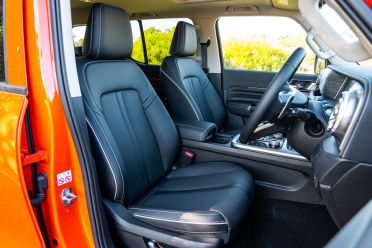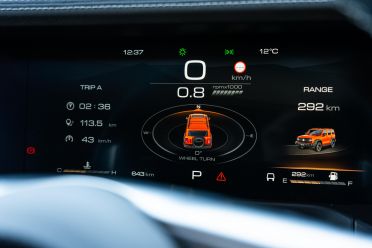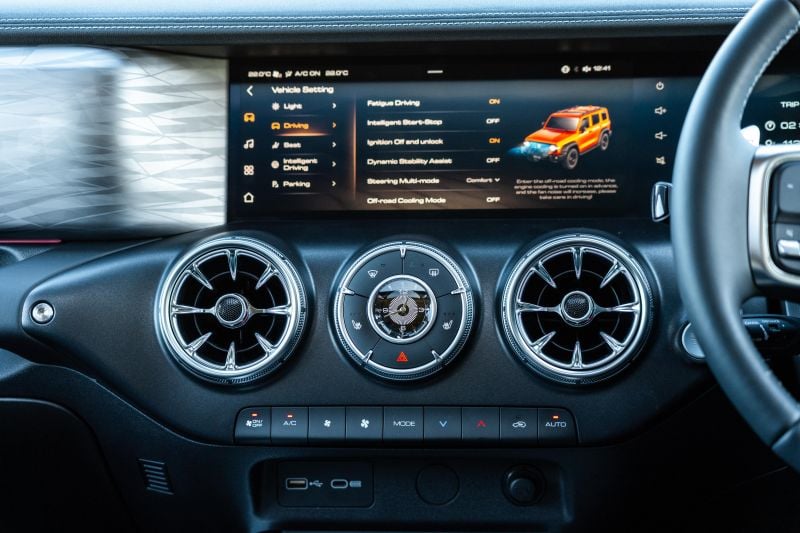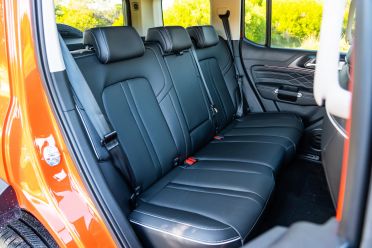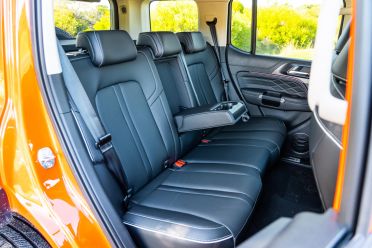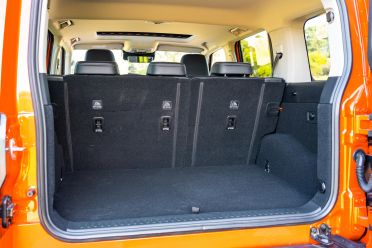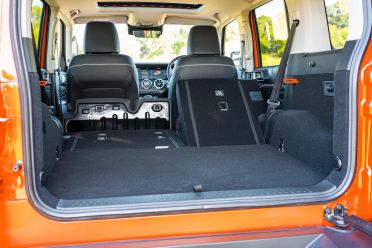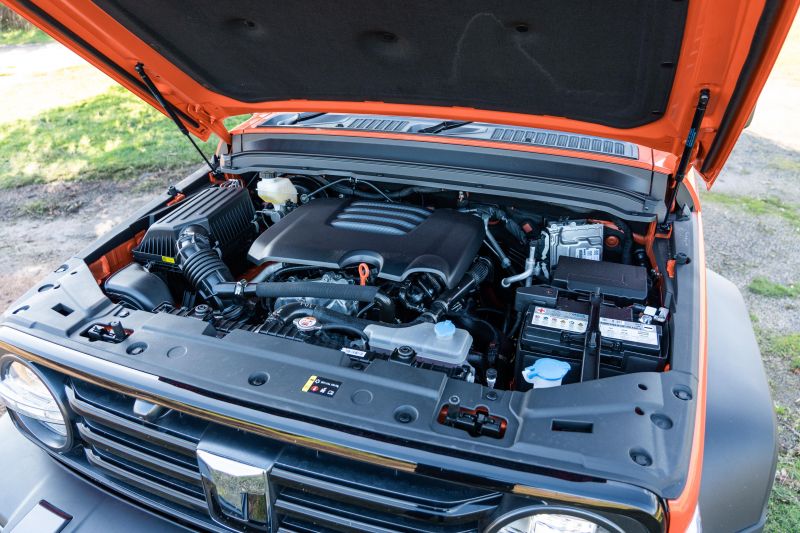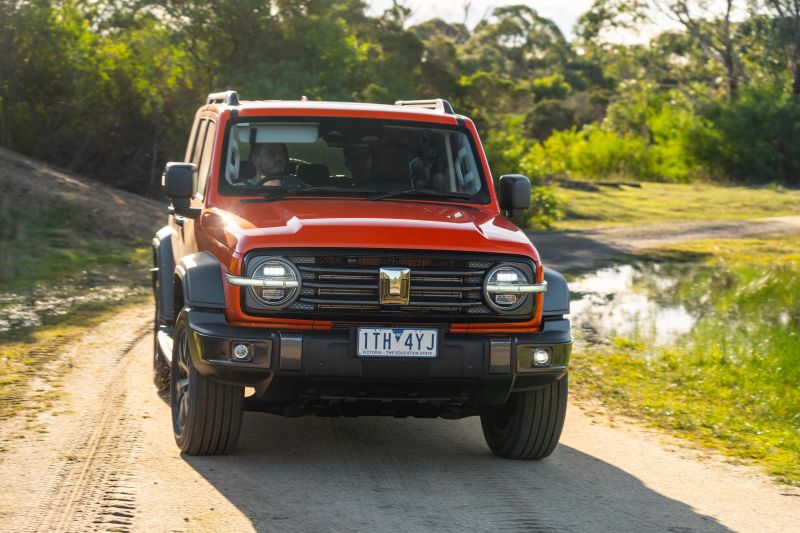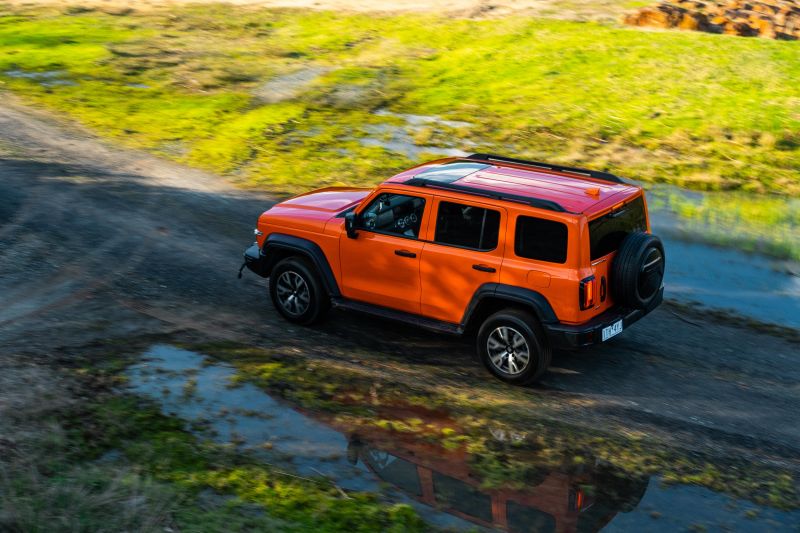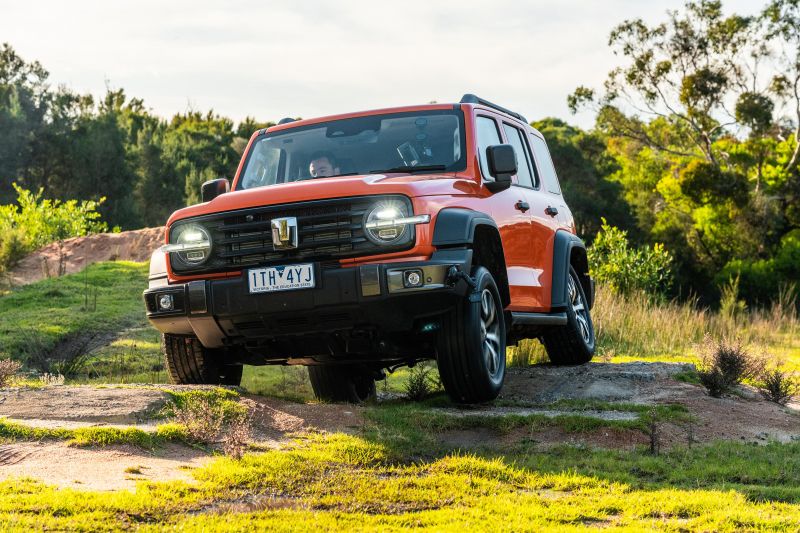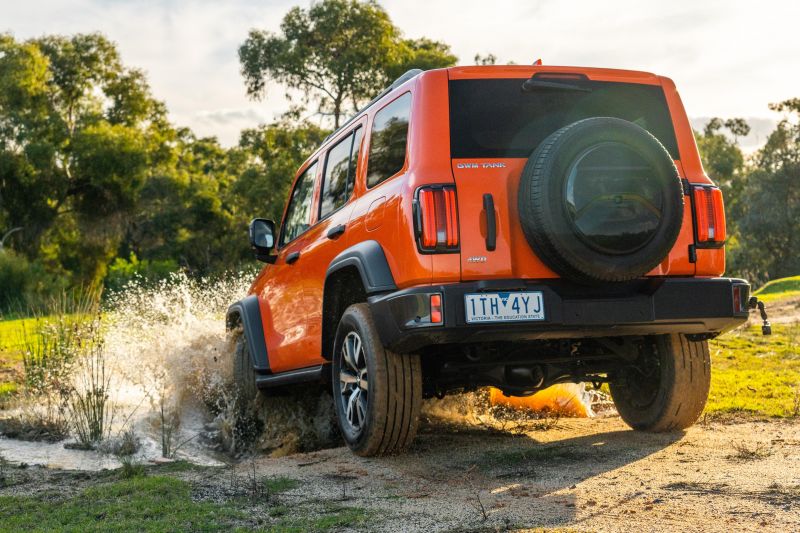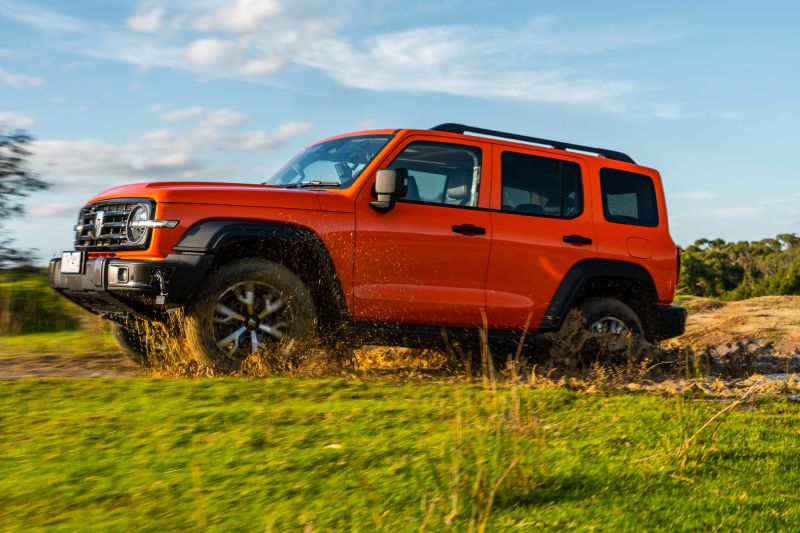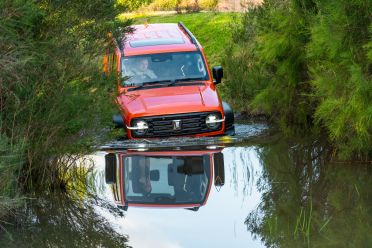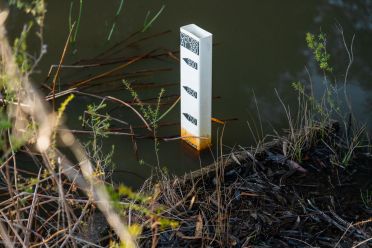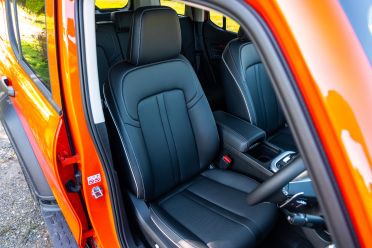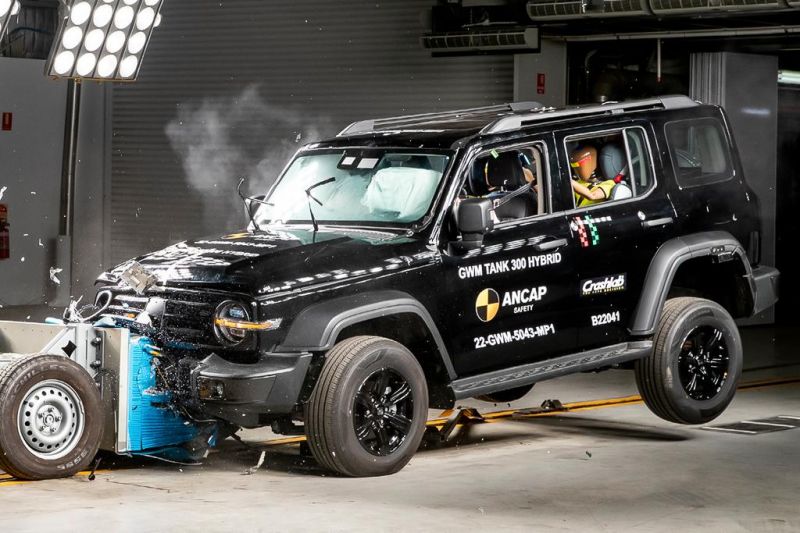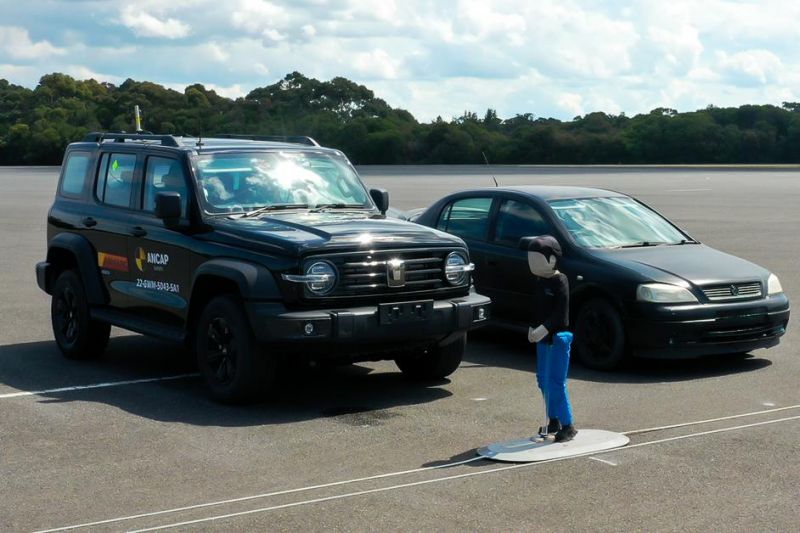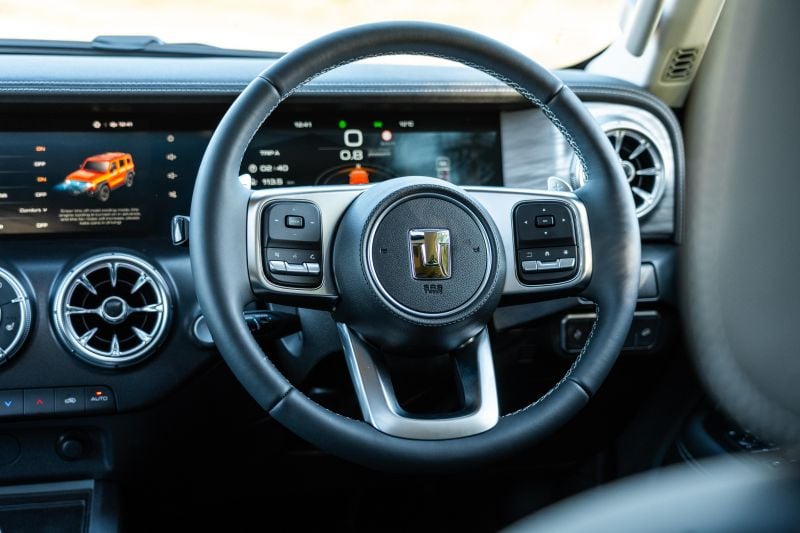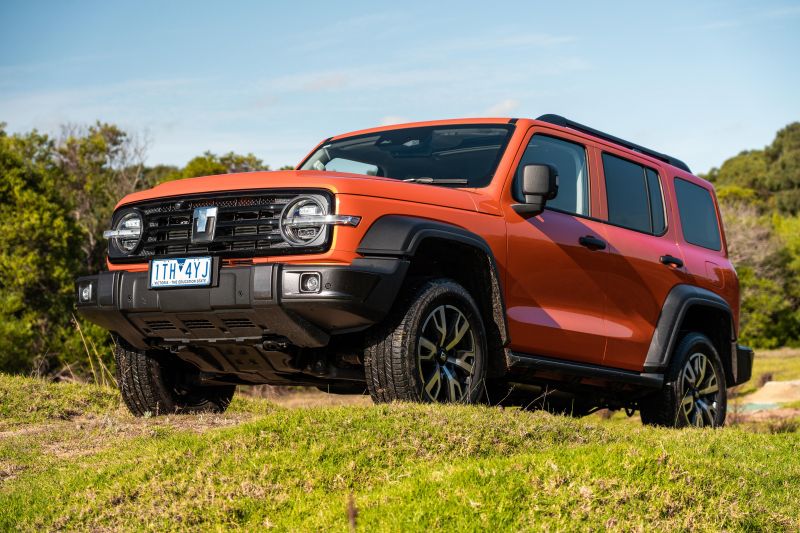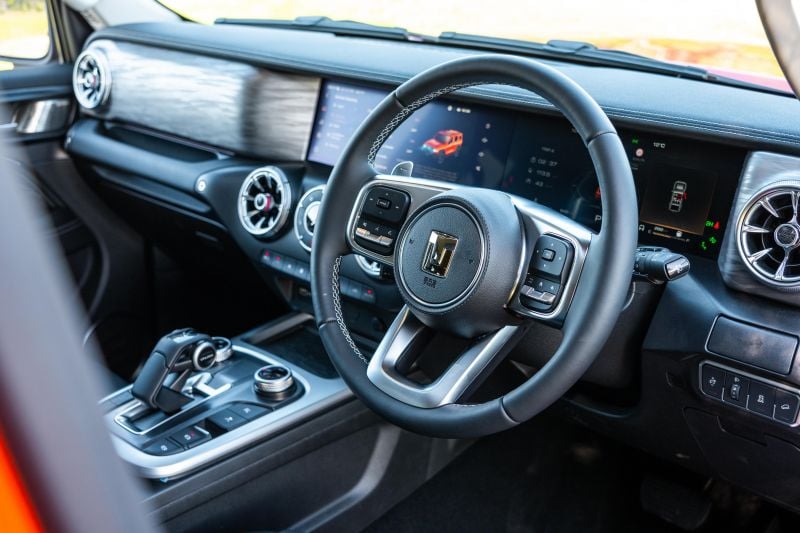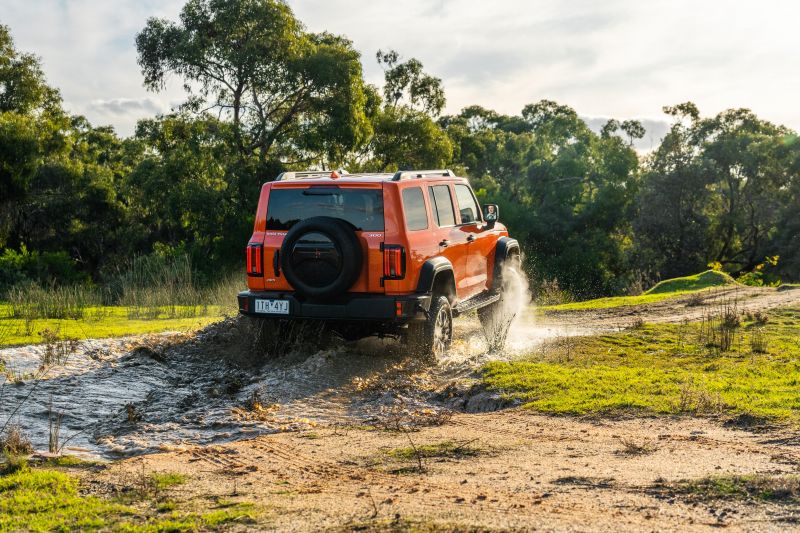China is moving into the 4×4 market.
Once the exclusive domain of the likes of Jeep and Land Rover, GWM is getting in on the action with its rough-and-ready Tank sub-brand – starting with the 2023 GWM Tank 300 you see here.
Looking like a lovechild between a Jeep Wrangler and Mercedes-Benz G-Class, the GWM Tank 300 is the first of the Tank-branded products to make it to Australia, likely to be followed by the larger Tank 500 which will offer a plug-in hybrid drivetrain.
The Tank 300 was initially meant to launch with a segment-first hybrid, but shipping delays meant the turbocharged petrol version has made it to our shores first – and that’s the car we have on test.
Priced from $50,990 drive-away in high-spec Ultra specification as tested, the Tank 300 shapes up as a hell of a lot metal for the money.
It’s larger, more powerful and more luxurious than something like a Suzuki Jimny which isn’t all that much cheaper in today’s market, while it’s significantly more affordable than something like a Jeep Wrangler or Land Rover Defender.
So, is GWM onto a winner?
How much does the GWM Tank 300 cost?
Prices start from $46,990 drive-away for the entry-level Tank 300 Lux, climbing to $60,990 drive-away for the flagship Tank 300 Ultra Hybrid.
Our Ultra petrol tester is $50,990 drive-away, meaning the Hybrid commands a hefty $10,000 premium over its petrol-only counterpart.
The Tank 300 occupies an interesting space in the market, sitting above the most expensive Suzuki Jimny GLX ($33,490), and well below the likes of the Jeep Wrangler Unlimited (from $81,450). Note these prices exclude on-road costs.
Meanwhile, the Tank 300 is positioned in the same price bracket as diesel-powered ute-based 4×4 SUVs like the Ford Everest 4WD (from $57,990), Isuzu MU-X 4×4 (from $54,900) and Mitsubishi Pajero Sport 4×4 (from $49,940).
Given the features and engine performance on offer, the Tank 300 stacks up as very compelling on paper. While the Tank 300 Hybrid commands a hefty premium over the equivalent petrol, there’s nothing else like it in the segment.
2023 GWM Tank 300 pricing:
- GWM Tank 300 Lux: $46,990
- GWM Tank 300 Ultra: $50,990
- GWM Tank 300 Lux Hybrid: $55,990
- GWM Tank 300 Ultra Hybrid: $60,990
Prices are drive-away
What is the GWM Tank 300 like on the inside?
There’s a very clear Mercedes influence in the cabin of the Tank 300.
From the bluff, upright dashboard to the conjoined 12.3-inch displays and circular air vents, it’s clear where GWM has drawn inspiration from Germany’s iconic retro-modern off-roader.
The cabin of the Ultra grade we have on test is mighty impressive, from the Nappa leather-lined seats to the quilted leatherette door inserts and the clear resolution of the digital screens. It does have quite a bit of ‘wow’ factor.
Perceived build quality is pretty solid, especially for the segment. The Jimny and Wrangler are quite utilitarian by comparison.
Storage is pretty decent too, with a good amount of cubbies and shelves to leave your odds and ends, though I wish the front door pockets were a little more substantial.
In the Ultra versions, the driver is treated to an electrically-adjustable seat which is neat, with both front seats also featuring both heating and cooling functions.
The steering wheel also offers reach and rake adjustment, but as you’ll find in most vehicles in the 4×4 segments you often find yourself sitting quite high in the cabin, and sort of looking down into the instrument binnacle.
The GWM Tank 300’s digital driver’s display gets top marks for colour and clarity, but a ‘needs improvement’ for layout and configurability.
The menus and layout apes what we’ve seen in the GWM Haval H6, with a Tank 300 for various graphics and a couple of extra off-road menus thrown in – colour matched to the vehicle though, which is cute. I’d love to see virtual dials put in, which no doubt would be desirable when off-roading.
Moving over to the left you have the giant 12.3-inch central touchscreen, which you’ll notice favours left-hand drive markets like China given the touch-based shortcuts on the screen are on the passenger’s side.
Like the driver’s display, the infotainment system is a Tank version of what we’ve seen in GWM Haval products, with the same menus, fonts and layouts with fairly minimal differentiation.
In terms of features, you get wired Apple CarPlay and Android Auto which look great on the high-resolution display, as well as DAB+. There’s no embedded satellite navigation, which means if you frequent regional areas with minimal service you could run into issues with mapping if you miss a turn off a pre-downloaded route, for example.
Otherwise, it’s fairly quick to respond to inputs and load menus, even if some of those menus are a little convoluted. Hopefully with updates we’ll see more simplified menu structures and cleaner text, as well as a virtual shortcut bar on the right-hand side for right-hand drive markets.
The nine-speaker Infinity-branded audio system in the Ultra is pretty decent for audio quality and depth.
Space in the back is good, thanks to the Tank 300’s boxy dimensions.
At 6’1 I had good head-, knee- and toe room, though the high-ish floor means you have a bit of a knees-up seating position which is fairly common for ladder-frame platforms.
Rear amenities include directional air vents, USB power outlets, map pockets behind both front seats, bottle holders in the doors, and a fold-down centre armrest with cupholders.
The second-row seats fold pretty much completely flat in a 60:40 split, and kiddies are catered for thanks to top-tether points across all three positions as well as ISOFIX anchors on the outboard positions.
GWM still doesn’t quote a luggage capacity for the Tank 300 in any of its official documentation.
Accessed via a heavy side-hinged tailgate, we can tell you the square, wide and flat load area is bigger than you’ll find in a Suzuki Jimny, and isn’t far off something like a Jeep Wrangler or Land Rover Defender 90.
There’s a full-sized spare wheel is mounted on the tailgate, if you hadn’t already noticed.
What’s under the bonnet?
The Tank 300 uses a 2.0-litre turbocharged four-cylinder petrol engine producing 162kW of power and 380Nm of torque, mated with an eight-speed automatic transmission.
Petrol models use a part-time four-wheel drive system with low-range, and feature a locking rear differential and a Tank Turn function to reduce the turning circle.
The Tank 300 Hybrid uses a 2.0-litre turbocharged four-cylinder petrol engine producing 180kW of power at 5500-6000rpm and 380Nm of torque at 1700-4000rpm, paired with a 78kW/268Nm electric motor. System outputs are 258kW and 615Nm.
Hybrid models use a nine-speed ‘Hybrid Automatic Transmission’ and a torque-on-demand full-time four-wheel drive system. It features electronically-controlled mechanical front and rear differential locks, a Tank Turn function to reduce the turning circle on gravel, and a crawl mode.
The Tank 300 uses 9.5L/100km on the combined cycle, while the Tank 300 Hybrid quotes 8.4L/100km. All models are rated to run on 91 RON regular unleaded.
How does the GWM Tank 300 drive?
This driving section will be in two parts: on-road and off-road.
I spent a few hours behind the wheel of the Tank 300 on the Hume Highway driving to and from the GR Corolla Morizo Edition launch in Broadford right after picking it up.
I was pretty impressed with the 300’s turbocharged performance, with punchy response right through the rev range. Paul did a 0-100 test which you can view in the Paul’s video review, and managed 8.95 seconds – which is about 2.0-3.0s quicker than most four-cylinder diesel 4×4 SUV.
At 100 and 110km/h the Tank is pleasantly refined and stable, with the drivetrain settling into a quiet background hum in eighth gear – spinning at just under 2000rpm – with acceptable insulation from road and wind noise relative to 4×4 rivals.
There’s a bit of whirring and wind whistle to contend with, but it’s otherwise a handy tourer. Plus, the soft ride takes the edge off sharper imperfections you’ll typically find on country highways, though the body can move around a bit.
I had plenty of time to play around with the Tank 300’s driver assistance systems, including the Highway Assist function that encompasses all-speed adaptive cruise control with traffic jam assist, as well as active lane centring.
GWM’s assists have come a long way compared to when the brand initially launched its current range of products, with a far more user-friendly level of response and assistance, particularly with lane support functions.
Some may still find the centring option too much; on a number of occasions I found it would let the 300 drift out of the lane which defeats the purpose, and on longer curves it’ll sometimes jolt randomly rather than smoothly follow the lines – see Paul’s video for a demonstration. Otherwise, the adaptive cruise did a good job maintaining the set speed on hills, but would occasionally be too conservative with following distance.
Blind-spot monitoring and rear cross-traffic alert are also handy, given the Tank 300’s elevated ride height and high shoulder line – you shouldn’t miss any lower-slung vehicles when negotiating gaps in traffic.
In town the Tank 300 doesn’t feel cumbersome or heavy to drive, though it can occasionally feel eager to launch from the lights with idle stop/start in play.
Tighter turns elicit a bit of body roll due to the ride height and soft setup, so keep that in mind if the top-heavy feel is a deal-breaker. At least the steering is pretty light and accurate, so you’re not endlessly twirling the steering wheel or constantly correcting like you might have to in some other off-roaders.
It’s otherwise agreeable, and if driven sedately it’s quite an effortless and luxurious place to spend time. That tall body and soft suspension means the Tank 300 eats speed humps for breakfast, and unlike some specialised off-roaders it is less susceptible to scuttle shake over pockmarked roads – though it’s not immune.
Parking this big ol’ thing may be daunting at first, given the long bonnet and chunky wheel arches as well as the high shoulder line. Thankfully, the surround camera system is excellent, as we’ve come to expect from the Chinese brand, as are front and rear parking sensors in addition to rear cross-traffic assist.
During the brake test during filming, Paul noted the Tank 300 demonstrated an alarming level of nose dive under emergency stop conditions, to the point where one of the rear wheels almost left the road and the vehicle squirrelled about as it came to a stop – not the most confidence-inspiring trait in those circumstances.
Paul Maric also took the Tank 300 off-road, to test out GWM’s claims of this new model being a certified 4×4.
Approach and departure angles are 33.0 and 34.0 degrees respectively, with ground clearance quoted at 224mm. There’s standard underbody protection, too.
Paul noted the simplicity of activating the rear differential lock, which helped the Tank 300 walk over the offset mogul test.
He did also note, however, that the traction control wasn’t smart enough to get the vehicle out of low-traction scenarios without the rear differential activated.
The Tank 300 had no such issues on our hillclimb and mud bogs, irrespective of whether the front and rear diffs were locked.
It walked up when in 4L with the diffs open, and with the diffs locked was able to stop midway and then get going again with no fuss.
Coming down the other side, the Tank 300’s nifty ‘Transparent Chassis Function’ helps create a clear view ahead of the vehicle over crests and on each side to maximise visibility when off the beaten track.
Paul was also satisfied with the performance of the Tank 300’s hill-descent control function, which maintained the set speed down a sharp decline.
The Tank 300 successfully navigated the water crossing, which was at a relatively high 650mm after recent heavy rain. GWM quotes a wading depth maximum of 700mm.
It went through without any issues, and the standard tyres helped climb out of the pool no dramas.
Over the boulders set in Rock mode, the Tank 300 walked over comfortably with no touchdowns, with Paul highlighting overall comfort as a key takeaway, and good throttle control.
To see Paul’s detailed off-road impressions in more depth, check out the Paul’s video review.
What do you get?
Tank 300 Lux + Lux Hybrid highlights:
- 17-inch alloy wheels
- Auto-folding, heated exterior mirrors
- LED headlights and tail lights
- Daytime running lights
- Sunroof
- Two-piece under-body guard
- Tyre pressure monitoring
- Crawl Control
- Tank Turn
- Front, rear parking sensors
- Power driver’s seat
- ‘Comfort-Tek’ leather upholstery
- Microfibre and leather steering wheel
- 12.3-inch digital instrument cluster
- 12.3-inch touchscreen infotainment system
- Front and rear USB ports
- Apple CarPlay and Android Auto
- 9-speaker audio system
- Ambient interior lighting
- DAB+ digital radio (hybrid only)
- 12V power outlets (front and luggage cabin)
Tank 300 Ultra adds:
- 18-inch alloy wheels
- Nappa leather seats
- Heated and cooled front seats
- Powered driver seat incl. massage function
- Heated, leather-wrapped steering wheel
- Wireless phone charging
- 9-speaker Infinity sound system
- More ambient lighting colours
Tank 300 Ultra Hybrid adds:
- Semi-autonomous parking assist
- Driver’s seat and mirror memory
- Auto reverse tracking
Is the GWM Tank 300 safe?
The Tank 300 wears a five-star ANCAP safety rating with 2022 datestamp, based on local crash tests – something the Jimny and Wrangler cannot match. This rating covers petrol and hybrid Tank 300 variants.
It scored 88 per cent for adult occupant protection, 89 per cent for child occupant protection, 81 per cent for vulnerable road users, and 85 per cent for safety assists.
While the Tank 300 scored well across all key categories, ANCAP’s media release noted a penalty for vehicle-to-vehicle crash compatibility.
“Full points were recorded for all four critical body regions of both the driver and front seat passenger in the frontal offset test. This high score was however offset by the maximum 4.00 point penalty for vehicle-to-vehicle compatibility as the front structure of the Tank 300 was shown to pose a high risk to the occupants of an oncoming vehicle, if struck,” the independent crash tester said.
“Similar high scores were seen for the Tank 300’s ability to protect the driver and front seat occupants in the range of side impact crash test scenarios.”
Further, Weak performance was noted for protection of the head and chest of the rear passenger in the full-width frontal set, which ANCAP suggested could be addressed with “improvements to the restraint system”.
Standard safety equipment includes:
- 7 airbags incl. front-centre
- Adaptive cruise control
- Autonomous emergency braking
- Blind-spot monitoring
- Lane departure warning
- Lane keep assist
- Rear cross-traffic assist
- Surround-view camera incl. ‘Transparent Chassis Function’
- Traffic sign recognition
Tank 300 Hybrid adds:
- 6 parking sensors (up from 4)
- Front cross-traffic assist
Colours
Standard: $NCO
Premium: $595
- Pearl White
- Crystal Black
- Dusk Orange
- Lunar Red
How much does the GWM Tank 300 cost to run?
The Tank 300 is backed by a seven-year, unlimited-kilometre warranty and five years of roadside assistance.
GWM also offers five years of capped-price servicing for the Tank 300 like its wider line-up, with intervals of 12 months or 10,000km for the first visit, and then 12 months or 15,000km after that.
Pricing for the first five services are quoted at $300, $300, $550, $550 and $300 – totalling $2000 over five years.
In terms of real-world fuel consumption we were seeing 8-9.0L/100km on the freeway and 10-11L/100km in town. That’s in the ballpark of GWM’s claim, but the petrol Tank 300 can’t match the efficiency of diesel-powered 4×4 rivals.
Note all Tank 300 models – including the Tank 300 Hybrid – can run on 91 RON regular unleaded fuel.
CarExpert’s Take on the GWM Tank 300
The Tank 300 is more than just a copycat take on some of the world’s most iconic off-roaders.
Packing retro-inspired looks, a nicely presented cabin, and a feature list that leaves you wanting for little, the Tank 300 will put brands like Jeep on notice – you can pretty much two of these for the price of a Wrangler Unlimited.
It also has a punchy turbocharged drivetrain and capable 4×4 running gear that dealt with our relatively light tests with minimal fuss – if you only need mild 4×4 ability with features that are easy to use and engage, it’s pretty good.
Even better, unlike the Suzuki Jimny or Jeep Wrangler, the Tank 300 is a pretty comfortable and easy thing to live with both in town and on the highway, with all the comfort and tech you’d expect out of a road-biased SUV.
That’s not to say it’s perfect, however. The convoluted layout of the infotainment interface that favours left-hand drive China is frustrating, while the lack of satellite navigation and wireless smartphone mirroring are blanks in the spec sheet that should be included of a vehicle at this price point launching in 2023.
The suspension also poses an issue in emergency braking situations as demonstrated by Paul, though the Tank 300’s performance in ANCAP crash testing shows this is far from unsafe overall. Having a full-time four-wheel drive system would also be a good upgrade for the petrol Tank 300 in terms of all-weather on-road performance.
I’d be quite keen to try the Tank 300 Hybrid when it arrives, given it’s a truly unique offering relative to rival 4x4s, but even in standard petrol guise this new arrival makes a compelling case for itself if you’re willing to take a chance on the GWM brand – given the Chinese manufacturer’s minimal recognition amongst 4×4 motorists.
Click the images for the full gallery
MORE: Everything GWM Tank 300

